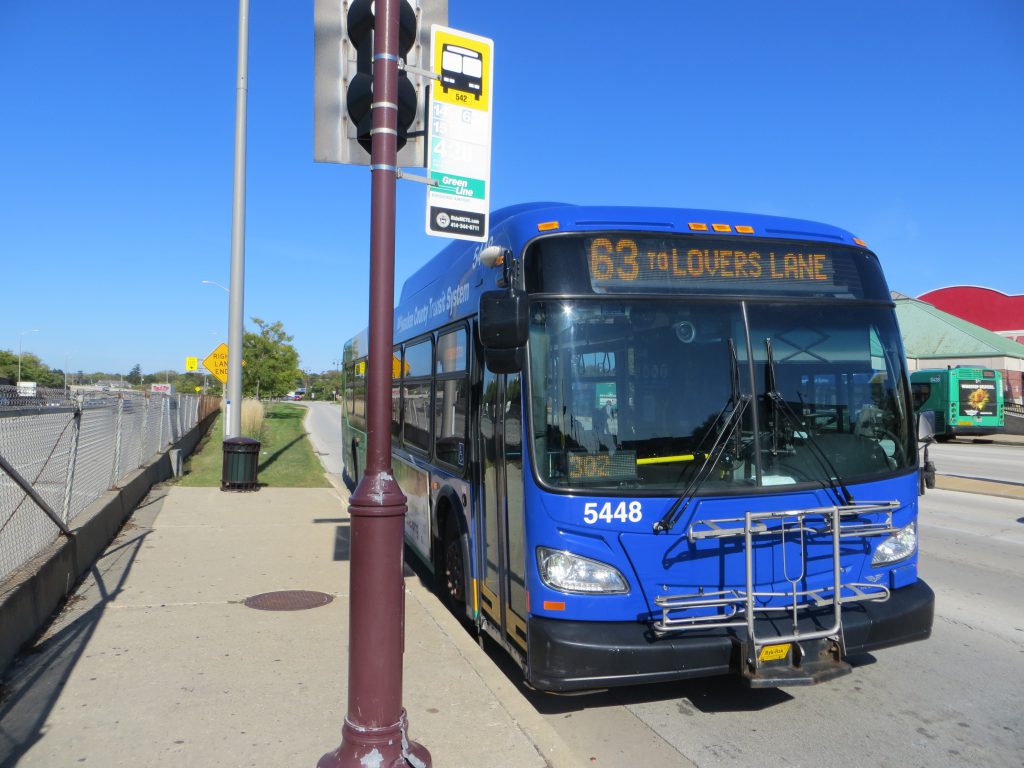Disabled Riders Decry End To Taxi Service
Transit Union demands more funding, others push sheriff budget cuts at public budget meeting.

MCTS Bus. Photo by Michael Horne.
Transit, in one form or another, was the major topic for Milwaukee County residents at the county board’s annual public budget meeting Tuesday night.
More than 30 county residents provided public comment, and, save a few speakers, the majority were primarily concerned with the proposed elimination of the paratransit taxi service, cuts to transit in general and the contract negotiations between the transit union and the Milwaukee County Transit System (MCTS). There were also several speakers who advocated for cutting the sheriff’s office budget and using those funds elsewhere in the county budget.
The annual public meeting is an opportunity for citizens to provide feedback directly to the board on the next year’s county budget before the board votes on it.
Paratransit Taxi Service
County Executive David Crowley‘s recommended budget would discontinue the paratransit same-day, on-demand taxi service.
The service allows disabled county residents to call a taxi to take them to appointments, work and anything else they need to access. At the public meeting Tuesday, many disabled residents explained to supervisors that the taxis were critical to maintaining their independence.
On top of that, nearly all of the speakers said that another service option, the paratransit bus service, cannot replace what they get out of the on-demand taxis — especially when the need is an emergency.
Jennifer Wenzel, President of the Milwaukee Chapter of the National Federation of the Blind, told supervisors that many blind and vision impaired people use the taxi services to get to work. Because the vans are a rideshare service that need to be scheduled in advance which does not take riders directly to their destination, they are not always a viable method for people to get to and from work.
“I myself am pretty busy in my life,” said Kevin Meyers, “There’s many things that I do. Using that van service has not worked for me. There’s been too many times I’ve been late I’ve had to cancel appointments; there’s been many times they’d go right past my drop off point to pick up somebody else, or drop them off.”
Meyers said that his job often involved him being on call, and that the bus service would not allow him to respond on time when called in. “Being out of commission for one and a half to two hours, that would not work, I could not do my job,” Meyers said.
Barbara Beckert, director of Disability Rights Wisconsin, told supervisors that many people with disabilities rely on the county’s paratransit services for employment, healthcare and voting. “And I can tell you, that is one of the most significant barriers people have to participate in our democracy is they don’t have transportation,” she said. “They may not be able to get to DMV to get a photo ID, they may not be able to get to their polling place. So your support is making a difference to enable people to be integrated members of our community and to participate in our democracy.”
Milwaukee County Board Chairwoman Marcelia Nicholson and Supervisor Liz Sumner, chair of the finance committee, authored a budget amendment that was intended to restore the on-demand taxi service. The amendment was recommended for approval by the finance committee.
But transit officials and Crowley did not eliminate the taxi service because they lacked the funding to simply maintain it. The decision, Donna Brown-Martin, director of the Milwaukee County Department of Transportation (MCDOT) told supervisors more than once this month, was because of a change in federal regulations created by the Federal Transportation Administration.
“Yes, we do have to come up with an alternative that will provide services for people,” she told the board’s finance committee. “I just can’t provide you with exactly what’s out there right now, because it violates ADA requirements and the state and Milwaukee County is not going to do that.”
She said MCDOT will work with advocates and stakeholders in the disabled community to come up with a solution. But she added that she cannot move forward with the taxi service as it currently is because it would violate federal regulations and “the last thing I want to do is to lose my federal funding for overall transit efforts.”
Transit Union Contract and Sheriff’s Budget
Members of the local Amalgamated Transit Union (ATU) 998 attended the board’s public meeting and called on supervisors to provide MCTS the funding it needs to meet the union’s contract demands. The union has been negotiating a new two-year contract with MCTS since May. Recently negotiations came to a head when members voted down MCTS’ final contract offer and authorized a strike.
Several residents spoke in favor of reducing the budget of the Milwaukee County Sheriff’s Office (MCSO) and in favor of some of the amendments authored by Sup. Ryan Clancy that would do just that. Clancy authored more than 30 amendments that would take funding from the MCSO.
One resident, Alex Larson, said he felt the MCSO was unaccountable to the board or county residents, despite their request for more funding. “There are so many needs that need to be met outside of policing,” Larson said.
If you think stories like this are important, become a member of Urban Milwaukee and help support real, independent journalism. Plus you get some cool added benefits.
More about the 2023 Milwaukee County Budget
- MKE County: Crowley Says House of Correction Renamed, Despite Board’s Opposition - Graham Kilmer - Nov 18th, 2022
- Supervisor Vincent Applauds Prioritization of Transit, Parks, Public Safety, and Equity in 2023 Budget - Sup. Kathleen Vincent - Nov 11th, 2022
- MKE County: Board Adopts 2023 County Budget - Graham Kilmer - Nov 11th, 2022
- Board of Supervisors Adopt 2023 Milwaukee County Budget - County Board Chairwoman Marcelia Nicholson - Nov 11th, 2022
- Supervisor Alexander Assembles Unlikely Coalition in the Name of Public Safety and Shoreline Protection - Sup. Deanna Alexander - Nov 10th, 2022
- Finance Committee Recommends Task Forces on Paratransit, MCTS Safety - Sup. Juan Miguel Martinez - Nov 4th, 2022
- Chairwoman Nicholson and Supervisor Martin Commend Public Participation at Annual Public Hearing - County Board Chairwoman Marcelia Nicholson - Nov 3rd, 2022
- MKE County: Disabled Riders Decry End To Taxi Service - Graham Kilmer - Nov 2nd, 2022
- Supervisor Taylor Fights Back Against Comrades Socialist Agenda - Sup. Steve F. Taylor - Oct 27th, 2022
- Finance Committee Unanimously Recommends Supervisors Rolland, Taylor, Martinez Amendment Increasing Infrastructure and Parks Funding - Sup. Shawn Rolland - Oct 27th, 2022
Read more about 2023 Milwaukee County Budget here
More about the Paratransit Service Debate
- Transportation: Frustration With Paratransit System Persists - Graham Kilmer - Nov 22nd, 2024
- Transportation: New On-Demand Paratransit Service is Working - Graham Kilmer - Sep 27th, 2024
- Transportation: Limited Funding Pushes Up Fares for New Paratransit Taxis - Graham Kilmer - Jul 26th, 2024
- Transportation: Paratransit Taxis Could Return This Year - Graham Kilmer - Apr 26th, 2024
- MKE County: County’s Paratransit Service Shows Improvement - Graham Kilmer - Mar 20th, 2024
- Transportation: County Working To Revive On-Demand Paratransit Taxis - Graham Kilmer - Dec 8th, 2023
- Transportation: Supervisors Recommend Funding for On-Demand Paratransit, Despite Objections - Graham Kilmer - Nov 6th, 2023
- MKE County: Board and County Exec At Odds Over Debt, Spending - Graham Kilmer - Nov 5th, 2023
- Finance Committee Recommends Two Amendments to Address Paratransit Concerns - Sup. Peter Burgelis - Nov 3rd, 2023
- Transportation: Board Plans Lobbying Push for Transit Funding - Graham Kilmer - Oct 25th, 2023
Read more about Paratransit Service Debate here
Political Contributions Tracker
Displaying political contributions between people mentioned in this story. Learn more.
MKE County
-
J.D. Vance Plays Up Working Class Roots, Populist Politics in RNC Speech
 Jul 17th, 2024 by Graham Kilmer
Jul 17th, 2024 by Graham Kilmer
-
Ron Johnson Says Free-Market Principles Could Fix Education
 Jul 17th, 2024 by Graham Kilmer
Jul 17th, 2024 by Graham Kilmer
-
RNC Will Cause Some County Services To Be Moved to Wauwatosa
 Jul 12th, 2024 by Graham Kilmer
Jul 12th, 2024 by Graham Kilmer
Transportation
-
MCTS Adds 28 New Buses
 Jul 13th, 2024 by Graham Kilmer
Jul 13th, 2024 by Graham Kilmer
-
MCTS Designing New Bus Shelters
 Jul 10th, 2024 by Graham Kilmer
Jul 10th, 2024 by Graham Kilmer
-
MCTS Updates RNC Bus Detours To Better Serve Downtown, Riders
 Jul 9th, 2024 by Jeramey Jannene
Jul 9th, 2024 by Jeramey Jannene





















